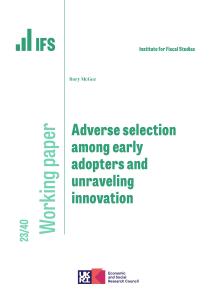Young people in the UK consume far above the maximum recommended levels of added sugar. It is likely that neither they nor their parents fully take account of the future health, social and economic costs of this high sugar consumption. This provides a rationale for policy intervention. The majority of young people's added sugar consumption occurs in the home, where purchases are typically made by parents. This means that understanding the purchase decisions of adults is important for policy design, even if the policies aim to reduce the consumption of young people. We discuss the merits of popular policies, including taxes, advertising restrictions and restrictions on the availability of specific foods, and we identify promising avenues for future research.
Authors

CPP Co-Director, IFS Research Director
Rachel is Research Director and Professor at the University of Manchester. She was made a Dame for services to economic policy and education in 2021.

Research Fellow University of Wisconsin
Martin, previously Deputy Research Director, is a Research Fellow at IFS and Professor of Economics at the University of Wisconsin.

Research Fellow London School of Economics
Kate is an IFS Research Fellow and an Assistant Professor at LSE, interested in public finance, industrial organisation and applied microeconomics.

Rebekah Stroud
Journal article details
- DOI
- 10.1111/1475-5890.12194
- Publisher
- Wiley
- Issue
- Volume 41, Issue 1, May 2020, pages 165-197
Suggested citation
Griffith, R et al. (2020). 'What's on the Menu? Policies to Reduce Young People's Sugar Consumption' , 41(1/2020), pp.165–197.
More from IFS
Understand this issue

Liberal Democrat manifesto: a reaction
10 June 2024

Spring Budget 2024: the Chancellor’s options

It's time to stamp on a tax that penalises landlords and renters
22 January 2024
Policy analysis

Tax and public finances: the fundamentals
23 August 2023

Free breakfast clubs in schools: what Labour’s plans would mean for pupils and families
25 June 2024

How do the last five years measure up on levelling up?
19 June 2024
Academic research

Longer-term impacts of the COVID-19 pandemic on the dietary purchasing choices of British households
4 April 2024

Saving by buying ahead: stockpiling in response to lump-sum payments
2 February 2024

Adverse selection among early adopters and unraveling innovation
18 December 2023